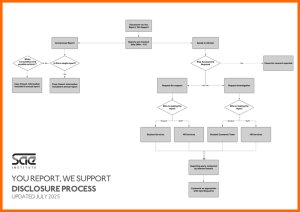You Report, We Support
We do not tolerate any form of discriminatory behaviour, violence or harassment in the communities of AD Education UK institutions.If you experience or witness any incident of this kind, we encourage you to report it using the form below.


Respect Yourself
Respect Others
Respect Difference
As an AD Education UK institution, we have zero tolerance for violence, harassment and discrimination of any sort.
We won’t tolerate any form of abuse in our communities, no matter where – on our campuses, events or online. We’re committed to ensuring all people are treated with dignity and respect, regardless of age, disability, gender identity, gender reassignment, marriage and civil partnership, pregnancy and maternity, race, religion or belief, sex, or sexual orientation.
If you are a student of colleague at SAE and experience or witness any incident of bullying and harassment, discrimination, hate crime or sexual misconduct, tell us about it here.
Report Anonymously • Report and Speak to an Advisor
How can I report an incident?
Anyone can report an incident via our reporting form. When using the reporting tool, you’ll need to provide a brief overview of the incident and include only key information about what happened. We ask that you only provide key information because what you submit may be relevant if at any point this becomes a legal matter.
There are two ways you can tell us what happened:
Report anonymously
You can submit this form without providing your contact details. Choosing to report anonymously means you’ll submit your report without completing any personal details. We won’t be able to contact you once we’ve received the report to offer advice or support. However, the information you report will help us to provide better support to others and inform prevention work across SAE. Please note that reporting anonymously won’t lead to formal action being taken.
You Report, We Support
Things might feel difficult or tough at the moment, but by choosing to leave your contact details, we’ll be able to provide you with better support and potentially stop something similar from happening to someone else.
You have the opportunity in this report to select a preference for who you would like to be contacted by from SAE.
Once you’ve submitted the report, your preferred advisor will contact you within five working days to offer advice and support.
This doesn’t initiate a formal complaints process but your Advisor will support you if you wish to make a formal complaint or report an incident to the Police.
Your data is important to us. We won’t collect or store any information that goes against our Privacy Policy. We’ll keep your information confidential and won’t disclose any personal or identifiable information to others unless we believe there’s a genuine threat to a person’s health and safety.
Report Anonymously • Report and Speak to an Advisor
How we process your report
Tap here or on the image below to expand and find out more:
Bullying, Harassment and Sexual Misconduct
AD Education UK (ADE UK) is committed to providing safe, welcoming and inclusive working and learning environments for all members of ADE UK’s community of students and staff.
Bullying, harassment and sexual misconduct (which includes sexual harassment) are unacceptable behaviour and will not be tolerated.
What is Bullying
Bullying is behaviour by an individual or group over time that intentionally hurts another individual or group either physically or emotionally. Bullying can take many forms (for instance cyber-bullying via text messages, social media and gaming, which can include the use of images and video). Bullying can be defined as an imbalance or power between the perpetrator and the victim. This could involve perpetrators of bullying having control over the relationship, which makes it difficult for those they bully to defend themselves. The imbalance of power can manifest itself in several ways; it may be physical, psychological, derive from an intellectual imbalance or by having access to the support of a group, or the capacity to socially isolate. It can result in the intimidation of a person or persons through the threat of violence or by isolating them either physically or online.
Bullying can take many forms:
- physical – hitting, kicking, taking/destroying belongings
- verbal – name calling, insulting, making offensive remarks, malicious rumours, malicious phone calls
- indirect – spreading stories or rumours, exclusion from social groups, sending malicious e-mails, text messages, chat room messages, e.g. MSN, web pages.
What is Harassment
Harassment includes unwanted behaviour or conduct that has the purpose or effect or violating a person’s dignity or creating an intimidating, hostile, degrading, humiliating or offensive environment because of, or be connected to, age, disability, gender reassignment, race, religion or belief, sex, sexual orientation.
Under our definition, we understand harassment to include domestic violence and abuse (which can also involve control, coercion and threats) and stalking.
ADE UK considers harassment to include any incidents of physical violence towards another person(s) on the basis of a protected characteristic and hate crimes, such as those criminal offences, which are perceived by the victim or any other person to be motivated by hostility or prejudice, based on the person’s disability or perceived disability; race or perceived race; or religion or perceived religion; or sexual orientation or perceived sexual orientation or transgender identity or perceived transgender identity.
Harassment may take many forms including but is not limited to:
- unwanted physical conduct or ‘horseplay’, including touching, pinching pushing or grabbing
- offensive jokes or language
- continued suggestions for social activity
- ‘outing’ or threatening to ‘out’ someone’s sexual orientation
- misuse of correspondence, including email, social networking and any other technology, including sending or displaying material that some people may find offensive
- racist, sexist, homophobic or ageist jokes or derogatory or stereotypical remarks about a particular ethnic or religious group or gender
- mocking, mimicking or belittling a person’s disability.
The distinction between bullying and harassment is the point at which the bullying behaviour directed at the target is also based on a protected characteristic, that behaviour is then defined as harassment.
What is sexual misconduct
Sexual misconduct relates to all unwanted conduct of a sexual nature. This includes but is not limited to:
- sexual harassment (as defined by Section 26 (2) of the Equality Act 2010)
- unwanted conduct that creates an intimidating, hostile, degrading, humiliating or offensive environment
- assault (as defined by the Sexual Offences Act 2003)
- rape (as defined by the Sexual Offences Act 2003)
- physical unwanted sexual advanced (Equality and Human Rights Commission: Sexual harassment and the law, 2017)
- intimidation or promising resources or benefits in return for sexual favours
- distributing private and personal explicit images or video footage of an individual without their consent (as defined by the Criminal Justice and Courts 2015).
Report Anonymously • Report and Speak to an Advisor
This form is for non-emergency reports. In a life threatening emergency, phone the emergency services Dial 999 and ask for an ambulance.
Support Services
Emergency or Urgent Help, including out of hours
This form is for non-emergency reports. In a life threatening emergency, phone the emergency services Dial 999 and ask for an ambulance.
If you require urgent non-medical support for your mental health call 111 to request assistance from the emergency services or visit nhs every mind matters – urgent support.
Out of Hours Support
Request to speak to an adviser through the You Report, We Support form. An Adviser can talk through the incident, inform you on how to make a complaint and let you know what support is available.
Policies and Guidance
You Report, We Support is underpinned by the Student Bulling, Harassment and Sexual Misconduct policy.
Awareness raising and training
From September 2025, all staff and students will be required to complete an online training module in order to take steps to prevent harassment and sexual misconduct. Access to the training is via the VLE.
Frequently Asked Questions
You Report, We Support is an online form through which students, staff and visitors can report incidents of bullying and harassment, discrimination, hate crime or sexual misconduct anonymously or via contacting an adviser to discuss.
Violence, harassment and discrimination may take the form of:
- Sexual harassment and/or assault
- Racism
- Homophobia
- Islamophobia
- Antisemitism
- Bullying and/or assault
- Sexism
- Transphobia
- Hate crime
- Online harassment
- Ageism
- Ableism
*Please note that this list is not exhaustive.
ADE UK students, staff and third parties (visitor, member of the public, etc) can make a report through the online form.
This form is for non-emergency reports. In a life threatening emergency, phone the emergency services, dial 999 and ask for an ambulance.
Yes, if you have witnessed an incident or if you are worried about someone else, you can make a report on their behalf. Please note that if you report on behalf of someone else, we will not be able to discuss any of their personal details or their case with you.
Choosing to report anonymously will mean that we are not able to contact the individual making the disclosure to offer support or advice. However, the information provided will be used to help identify areas of concern and inform prevention work across ADE UK.
While reporting anonymously will not lead to formal action being taken, it is an important way for the institution to know what types of incidents are occurring and allows us to work with areas identified to prevent, deter and eliminate these forms of abuse.
Where the person making the disclosure indicates they want to speak to an adviser, they will be able to select from a list of named staff who they would like to be contacted by.
Unless there is an immediate concern about safety, safeguarding and/or risk to life, the individual making the disclosure has the option to choose:
- No further action at this time.
- Make a report to the police
- Make a formal report to ADE UK. In this case, following a disclosure, a student or member of staff can proceed with a formal investigation under the relevant procedure.
Students and staff can continue to access internal and external support those these options.
The Student Casework Team will review all disclosures made through You Report, We Support on a daily basis (Monday – Friday).
If you have provided your contact details you will be contacted by the preferred team as stated in the report who will be able to offer advice, help and support and talk through the options available to you.
We aim to respond within 3 working days of submitting your report.
Yes. The information that you share is secure and only be seen by the Student Casework Team. We will always keep your information confidential (unless there is imminent risk of harm).
Your data is important to us. We won’t collect or store any information that goes against our Privacy Policy. We’ll keep your information confidential and won’t disclose any personal or identifiable information to others unless we believe there’s a genuine threat to a person’s health and safety.
No, disclosure does not create a formal complaint. Submitting a report in the first instance, is your way of accessing support, the opportunity to be heard and to consider the options before proceeding with any further steps.
No action will be taken immediately unless there is an immediate concern about safety, safeguarding and or risk to life.
- If your life or the lives of others is at risk.
- If the individual affected is under 18.
- If we are required to do so by law e.g. if a student shares information relating to criminal activity or planned criminal activity.
Students can contact complaints@sae.ac.uk.
Following receipt of your email the Student Casework Team will advise of the appropriate procedure.
- Complaints from a student against another student will follow the Student Disciplinary Policy.
- Complaints from a student against a member of staff may follow the Staff Disciplinary Policy where an allegation of misconduct is upheld through the complaint investigation.
- Complaints from a member of staff against another member of staff will follow the Grievance Policy.
- Matters of public interest will follow the Public Interest Disclosure Policy.
After reviewing a disclosure and cause for concerns are raised, the incident will be reported through the Cause for Concern process and referred to the Designated Safeguarding Lead.
If you are a student and would like support from the Student Wellbeing Team, please contact
- studentserviceslondon@sae.edu
- studentservicesliverpool@sae.edu
- studentservicesleamingtonspa@sae.edu
- studentservicesglasgow@sae.edu
If you are a member of staff and need support, please contact HR@icmp.ac.uk
Staff and students can submit a formal complaint via complaints@sae.ac.uk.
Staff who have direct academic or support responsibilities, or other direct professional responsibilities, in relation to a student are explicitly prohibited from entering into an intimate personal relationship with that student.
The Personal Relationships Policy provides further information, advice and guidance.































